 |
 |
 |
| Commissioner of Public Safety |
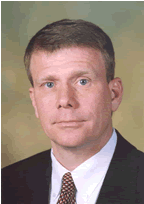 Kevin W. Techau |
Kevin
W. Techau was appointed Commissioner of the Iowa Department of Public
Safety by Governor Tom Vilsack in February 2002. He is the 19th person
to serve as the Commissioner of Public Safety since its inception in 1939.
Prior to this appointment, Techau served as the Director of the Iowa Department
of Inspections and Appeals. He had also served as an assistant Federal
Public Defender and had been in private practice with the Grefe and Sidney
firm in Des Moines.
Commissioner Techau is a graduate of the University of Iowa College of Business and the University's College of Law. After graduation, he spent seven years on active duty with the United States Air Force including two tours in Europe. Since leaving active duty, Techau has served with the Iowa Air National Guard where he is currently a Lieutenant Colonel with the 132nd Fighter Wing, Des Moines after having previously served with the 185th Fighter Wing Sioux City, IA.
|
| The Commissioner's Office is comprised of four bureaus. They are the Governor's Traffic Safety Bureau, the Intelligence Bureau, the Intergovernmental and Public Resource Development Bureau, and the Professional Responsibility Bureau. |
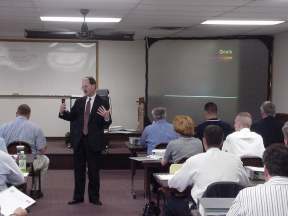 The Intelligence Bureau provides training and assistance to law enforcement agencies |
The
Intelligence Bureau provides support to all enforcement divisions of the
Department of Public Safety as well as to all other local, state, and
federal law enforcement agencies in Iowa. The Intelligence Bureau also
serves as a point of contact in Iowa for law enforcement agencies from
other states. The type of support provided to consumers varies with the nature of the request. Requests may involve helping to positively identify particular individuals when given incomplete information, or it might be as complicated as taking thousands of information items and organizing them in such a way that they make sense. In essence, the personnel of the Intelligence Bureau research, manage, and analyze information. They help free-up some of the investigator's time so he or she a can continue to focus on the case at hand, while the Intelligence Bureau handles some of the time consuming analysis of information already gathered. Intelligence Bureau employees use a methodical process to produce |
|
intelligence information, which assists law enforcement in the areas of
criminal investigation, enforcement of the law and the development of
crime control policy. Services provided to the law enforcement community
include the information and analytical services provided by Intelligence
Bureau personnel; the collection, networking, and dissemination capabilities
of The Iowa Law Enforcement Intelligence Network (LEIN); and the support
provided by the Counter-Drug Support Program of the Iowa National Guard.
|
|
Governor's Traffic Safety Bureau
 |
The Governor's Traffic Safety Bureau (GTSB) is responsible for administering federally funded highway safety programs in Iowa. The Bureau's primary goal is the reduction of death and injury on the state's streets and highways. The National Highway Traffic Safety Administration (NHTSA), a branch of the United States Department of Transportation, administers grant funds, which the GTSB applies for. Funds from successful grant applications are distributed to agencies within Iowa for special projects involving many facets of traffic safety, including occupant protection, alcohol, child passenger safety, traffic records, and general highway safety. Nine priority funding areas have been established: alcohol/impaired driving, occupant protection, speed, serious moving violations (police traffic services), |
| roadway
safety, motorcycle safety, pedestrian/bicycle safety, emergency medical
services and traffic records. During the past five years, the Bureau has
funded activities in all nine of these areas with current funding in eight
of the nine emphasis areas. While all 50 states receive basic highway safety funds, all other funding sources are available on a competitive basis. For example, Iowa qualifies for occupant protection monies because our statewide seat belt use rate of 81% is above the national average of 73%. |
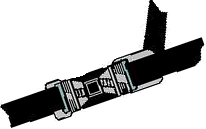 |
|
|
Professional Responsibility Bureau
|
In July of 2001, the Professional Development Bureau and the Professional Responsibility Bureau were combined, and retained the name Professional Responsibility Bureau (PRB). The PRB is responsible for hiring and training, as well as recognition and discipline for the Department of Public Safety. In addition to the departmental in-serve training, the PRB is responsible for the peace officer applicant process and the Basic Training Academy. It also administers the physical fitness program, coordinates supervisor training in management and leadership, conducts promotional testing, and recruits potential employees. |
 |
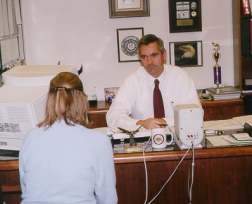 |
The Bureau is responsible for coordinating standardized in-serve training to all sworn members of the department. The Bureau also tracks all training given and received by peace officers members of the Department, as well as some training provided to civilian members of the Department. The Department of Public Safety takes pride in the integrity and professionalism of its employees. Any allegation of employee conduct is taken seriously. The PRB is responsible for conducting thorough investigation of all allegations of employee misconduct. Members of the PRB handle complaints by conducting fair, complete and impartial investigations of employee misconduct lodged by employees, or by the public. In Fiscal Year 2002, there werea 59 formal complaints, representing 146 allegations, filed with the PRB. Of those allegations, 36 were sustained, 28 unsustained, and 43 were unfounded. Of those remaining, 12 were closed administratively, and 27 are pending. |
|
The Department values the contributions that its members provide on a daily basis to the state. From ensuring the safety of Iowan through enforcement of motor vehicle laws and fire safety laws, to investigating crimes and ensuring the proper expenditure of funds, DPS employees are dedicated and take pride in their work. The PRB is responsible for recognizing those employees that excel in the performance of their duties. In addition, this Bureau prepares the monthly employee newsletter, the Communicator, as well as the Department's annual report .The Professional Responsibility Bureau is comprised of the Bureau Chief, three uniformed officers, two investigations officers, and three support personnel. |
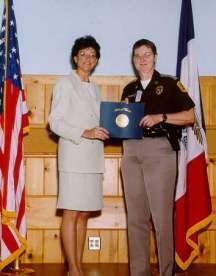 |
Intergovernmental
& Public Resource Development Bureau
|
The Intergovernmental
and Public Resources Development Bureau, was created in 2000 to coordinate
and facilitate the functions of public resource development, strategic
planning, and rulemaking, as well as grant proposal preparation and
monitoring, the Intergovernmental and Public Resources Development Bureau
is also responsible for the maintenance of the Department's World Wide
Web Site. The three person Bureau, works at developing and maintaining
effective communication within the Department, coordinating the Department's
Administrative Rules, seeking private source foundation and federal
grant monies, overseeing departmental media relations and public information,
and coordinating departmental strategic planning. |

Created October 1, 2002 BAL


